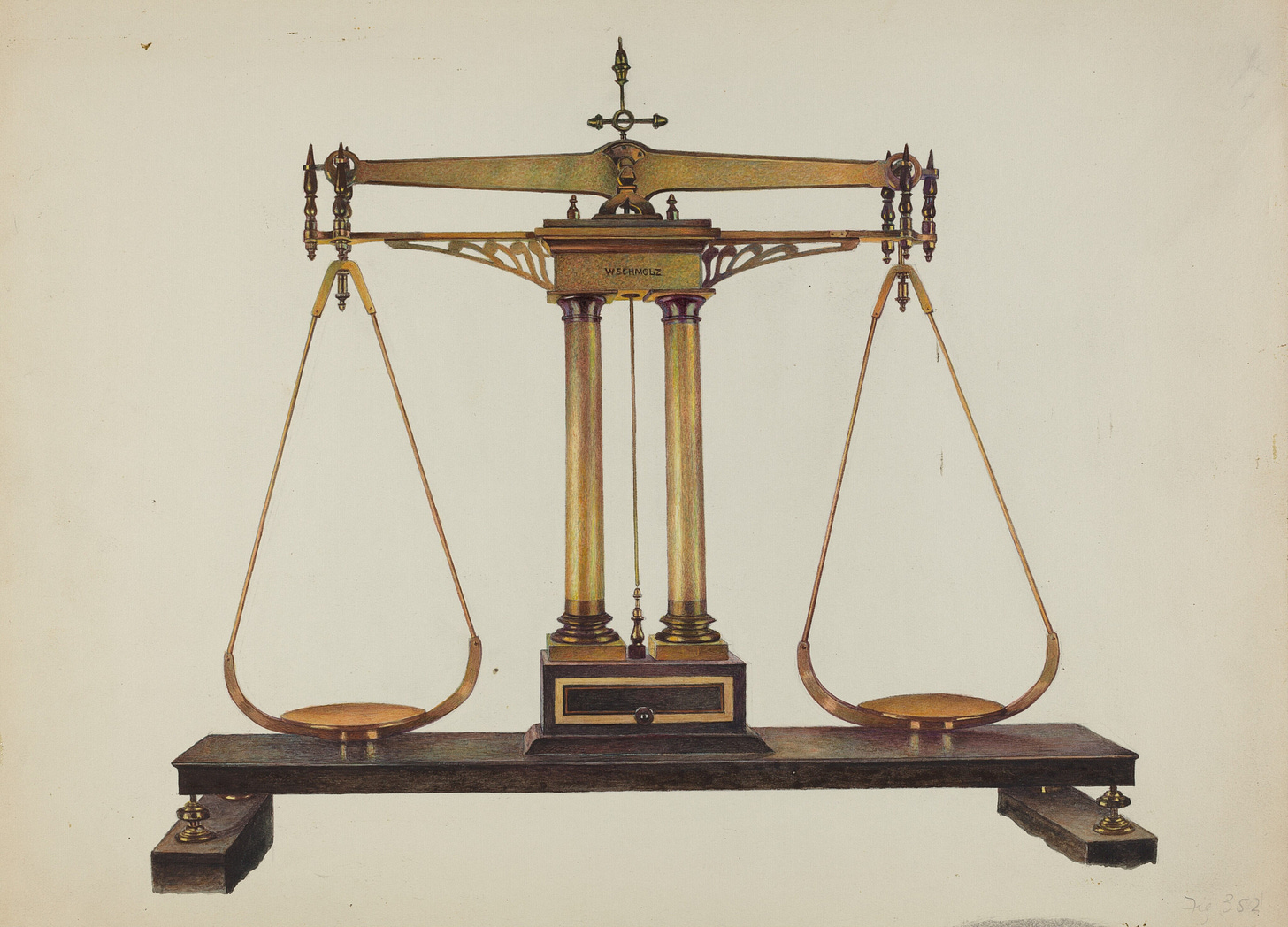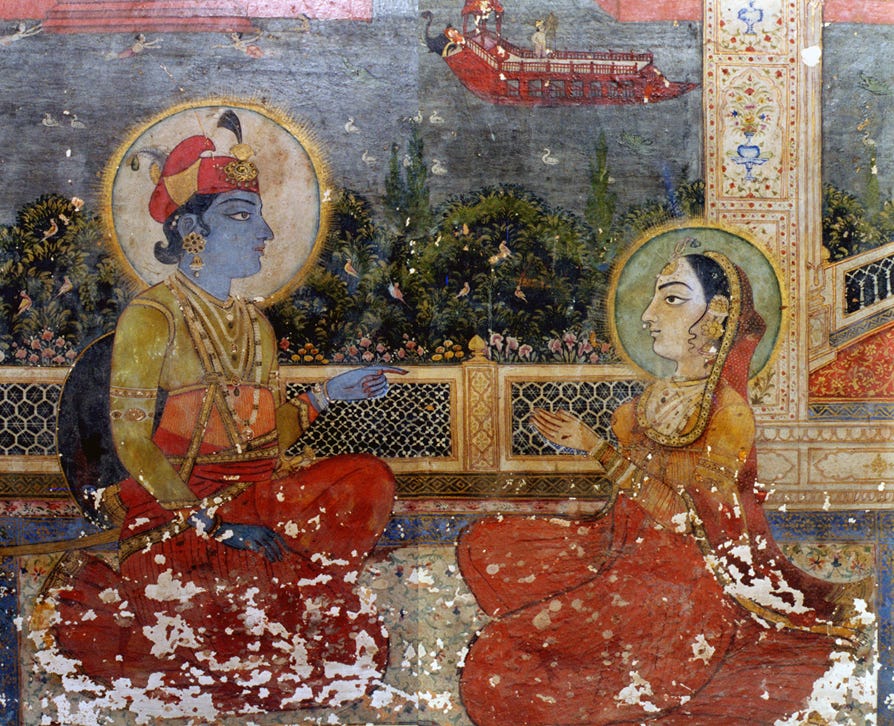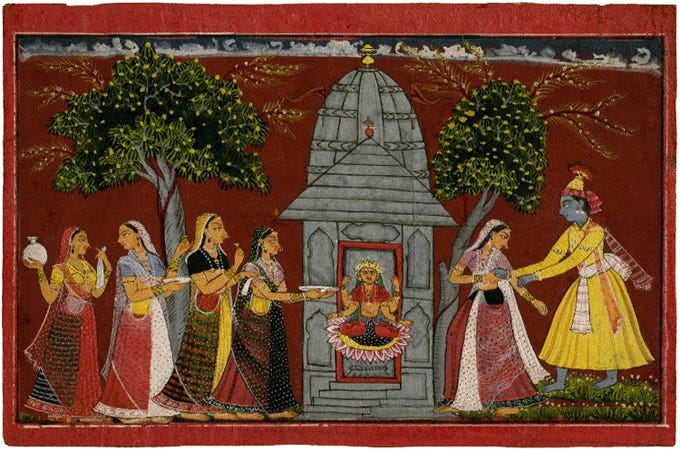
The Preserver-God in his most complete incarnation as Krishna - the author of the inimitable Gita - was once invited by one of his wives to concur with her plan to be weighed in gold.
Wait... what?
Ok, let’s start from the beginning.
Krishna married Princess Rukmini after kidnapping her from her own 'Swayamvar,’1 where she was meant to choose her husband - at her request.
You may find hard to believe that such a bold act could occur in the ancient ages. But what is a Princess to do when the one she loves - Krishna - is not invited to her own ‘Swayamavar,’ where she is meant to choose her husband? But why not, you ask?
Because Prince Rukmi, her brother, wanted her to marry S., his best friend. S. happened to be Krishna’s distant cousin and held a strong dislike for Krishna, which Rukmi shared. Needless to say, Krishna's invitation got lost in the process.
In a quandary, Princess Rukmini called upon an old Brahmin priest loyal to her and sent a clandestine message to Krishna. In her letter, she confessed her love and admiration for him, and implored him to rescue her from a fate worse than death.
No one can imagine what Krishna’s reaction was on receiving this urgent summons from a lovely, and undoubtedly the most beautiful in the land, Princess, admitting her love and suggesting a plan.
His response upon receiving it offers us a clue.
Krishna, dressed in his armor, had his best chariot prepared with four of his fastest horses harnessed to it.
Without any attendants or soldiers accompanying him, he took the reins himself and raced down the path to the Princess’ kingdom, carrying the Brahmin priest with him. He arrived just in the nick of time, sending the Brahmin priest ahead to inform the Princess to be ready.
On hearing the news of Krishna’s hasty departure at an ungodly hour, his older brother, the King, sensing trouble ahead, followed with his army.
In the midst of the 'Swayamvar' event, where the finest princes from various kingdoms had gathered, each hoping to prove themselves worthy of the Princess, and where Prince Rukmi stood beside his best friend, what did they witness?
The Princess emerged in her royal bridal finery to first seek the blessings of her family deity, the Goddess of Power. Her jewels seemed but a pointless addition to her beauty and demeanor as she walked slowly to the temple, leaving everyone awe-struck.
When she finished her worship and stepped outside again, she paused on the top step of the temple, seeming uncertain. The princes waited eagerly.
Out of nowhere, or so it seemed to them, Krishna appeared, dressed in regal splendor and battle gear, majestic and calm. He drove up in his chariot to the steps of the temple, reined in, one hand lightly resting on the hilt of his sword at his left side, and offered his right hand to Princess Rukmini.
Without needing further encouragement, Princess Rukmini walked swiftly towards him, accepted his hand, and with his support, boarded the chariot.
Her parents stood as though frozen, while the other princes watched with gaping mouths. Prince Rukmi, her brother, was unsure what shocked him more: his sister’s audacity or Krishna’s arrogance and boldness.
Krishna's self-declared mortal enemy, his cousin S., was left apoplectic. His intended bride had just boarded the chariot of his archenemy.
But before any of them could react, Krishna departed with the Princess in his chariot, leaving his elder brother, who had caught up to the event, to handle the furor.
What a furor it was—the Princess, the star of the event, had eloped with the hero of her dreams.
Her parents, also the King and Queen, sighed, resigned to it. After all, he was Krishna.
Once Krishna’s horses had thundered past, S. came to his senses—his promised bride had been kidnapped.
The brother shouted angrily for someone to fetch his horses so he could bring his sister back. Foolishly, S. volunteered to go with him as his dislike of Krishna overcame his common sense.
To his credit, S. mounted his chariot and, along with the brother, raced after the finest charioteer, undefeated warrior, and the magical creator of the Universe.
The princes felt cheated of their chances. One king, in particular, angry at the parents' resignation to the events, decided he must wage a battle to at least secure his honor and aid his friend, Prince Rukmi.
However, Krishna's brother met him in battle, and the two armies quietly settled the matter in Krishna’s favor.
Meanwhile, when Krishna saw who was following him, he decided to stop and resolve the issue. He slackened the reins and allowed the angry Prince and his cousin to draw closer.
Despite Rukmini pleading with her brother to allow her to leave with the Prince of her choice, Rukmi remained unwilling. Perhaps it was due to his promise to his best friend or the bruising of his ego.
Asserting his right as her brother, he declined the offer of truce from the handsome Lord who had won his Princess fair and square. Instead, he chose to challenge the finest swordsman to a duel.
He lost the duel, his sword, and his pride, as he was forced to his knees by the victor. Princess Rukmini ran to her love and begged for mercy for her brother, unable to bear the thought of his death on the eve of her happiness.
Krishna forgave his soon-to-be brother-in-law and invited him instead for their wedding.
However, Prince Rukmi had some choice words for Krishna, washing his hands off his sister and suggesting she might regret marrying a cowherd2 instead of his best friend, the prince.
Rukmi, with his friend still in the chariot, dumbstruck, turned it around and departed. As it turned out later, he had cause to rue his words when his best friend was killed by Krishna.
So, his sister did indeed choose wisely. Cowherd or not, he was her Prince. Krishna married her with the pomp and circumstance befitting a royal marriage, and in due time, Princess Rukmini became the Queen.

Now, it may come as a surprise to many, but in this incarnation, Krishna had to fulfill his previous promises to those who loved him so much as to undergo severe ‘tapas’—meditation - for thousands of years, just to experience being his wife.3
So, the Queen understood that she was the first among many wives Krishna had in this birth.
Among them was Princess Satyabhama, who took pride in her wealth, and status, and believed that Krishna loved her the most—a statement of fact that no one would dispute, considering her quick temper.
Krishna humored Satyabhama most of the time, while the Queen simply bore her boasts without ill will.
It was thus, one day, that Princess Satyabhama, in one of her magnanimous moments, announced with much fanfare that she would demonstrate her love for the Lord in a way that had never been done before.
The root cause of this is another story but we shall not entertain it today.
She declared that she would invite her husband to be weighed and donate the equivalent of his weight in gold, diamonds, precious stones, and jewels needed to balance the huge purpose-built scale brought to the Palace for this event.
One day, she broached the subject with Krishna. Rather, she informed him of her intent.
Krishna smiled mischievously and agreed to her plan.
Arrangements for the spectacular event were made by her team. The day dawned, and many assembled to witness the unusual event, curious about how much wealth it would take to balance the scale and eager to benefit from the promised donations by the Princess.
Krishna, invited by his third wife, smiled as he took his seat on the left side of the huge traditional scale in the Grand Palace Hall. The scale featured two grand square wooden seats, one to hold him on one side, and the equivalent weight on the other.
Beside the empty seat stood the Princess, poised to add her wealth onto the scale: gold, precious stones, hefty golden artifacts, and an array of jewels that were being handed to her by attendants.
Krishna, wearing a crown adorned with a familiar peacock feather and holding a golden flute in his right hand, tapped it rhythmically against the palm of his left as he watched and waited.
Once the Princess had loaded the opposite side with what she believed to be an equivalent weight to Krishna's, she nodded to the nearby attendant, who checked the scale and shook his head.
Surprised, she approached and checked for herself. Indeed, the scale was still tilted towards Krishna, and its needle had not budged an inch.
Vexed, the Princess turned her gaze to Krishna. He shrugged his shoulders implying he was just as puzzled. “Perhaps it needs more gold?” he ventured to suggest, trying to be helpful.
So, back she went to the other side, instructing her attendants to bring forth more of the valuables and every manner of heavy artifacts she possessed. She then requested additional gold bricks, convinced that just one more would tip the scales.
Still, the scales did not move an inch.
Krishna continued to watch with a twinkle in his eye, and a gentle expression on his face.
Princess Satyabhama's pride was being crushed with every passing minute, and she grew increasingly embarrassed and angry.
So, she did the next best thing - she dug in and ordered even more treasures to be brought from inside the vault and added them to the scale.
Yet, the needle stayed tilted towards Krishna.
Finally, after a long set of futile attempts, she admitted defeat, realizing her mistake. Approaching Krishna, she begged his pardon and requested that he relent.
At this request, humbly made and devoid of the ego the Princess had displayed throughout the event, Krishna glanced at Queen Rukmini, his eternal consort, who had been standing unassumingly in the background and smiled slowly.
The Queen returned his smile and walked to the other side of the scale. She instructed the attendants to remove all of the weighted jewels, heavy gold, and rare precious stones. The seat was emptied within minutes.
Then, Queen Rukmini, Krishna’s eternal love4, placed a single leaf of the Tulsi plant on the scale.
Instantly, the scales balanced as Krishna allowed them to achieve equilibrium.
Just a single leaf was all it took —for the Tulsi plant is dear to Krishna.5
Thus, it came to be that on that day in the Grand Palace Hall, with all of the royal invitees watching, Krishna demonstrated that the Queen of his heart6 was Rukmini.
Without pride, ego, or boastful speech, she loved him best and her offering7 made in love and devotion was one He accepted.

Sanskrit: ‘Swayam’ = Self [Choosing of] ‘Var’ = Groom
Krishna tended to the cows as a child, as he was raised among the cowherds in a place called Vrindavan.
It is mentioned in the ancient texts that some feel such an outpouring of love for God, that they seek to fulfil it through the experience of marital bliss, and if pleased, He grants such a prayer at a time and role of His choosing. Needless to say, they undergo most austere forms of meditation - a specific term for it in Sanskrit is tapas - to be so blessed.
She is also Queen Sita, the devoted wife of Rama, the Preserver-God’s earlier incarnation.
Tulsi was once wronged by Krishna in times past, and to atone for it, He promised her a special place in his heart, always. He rewarded her devotion and blessed her, ensuring that she would be revered in every household as the plant Tulsi, and no worship of Him would be considered complete without its leaves being used.
Goddess Lakshmi, Goddess of Wealth, is accepted as always being present in the heart of the Preserver-God, and from thence comes the idea that human generosity originates in the heart.
In the Gita, Krishna declares that even when those who are pure of heart offer him only a leaf, flower, fruit, or just water, he will gladly accept it when made in devotion.
Notes
Tulsi is a plant housed in every Hindu home and is considered highly sacred. Some larger homes have special square cement or mud pots built to house the plant in their backyards as a focal point, while others place it in ordinary pots in the front of the house. Various beliefs surround its worship, medicinal value, varieties, and growth patterns - for instance, it can wither easily, so some caution others from touching it indiscriminately. It is worshipped daily, especially by married women, and no Hindu religious ceremony is performed without Tulsi leaves. Annually, in the fall, Tulsi’s wedding to Krishna is celebrated in many parts of India.







Wonderful telling of this story, Jayshree! Thank you so much for sharing it.
Another beautiful story Jayshree, thank you so much 🙏💙💫